Has anyone asked you, “Can’t you just use an API for it?” and you thought to yourself, “How the hell is an API going to help my business?”.
APIs are the connective network that binds today’s digital ecosystems. Companies who understand the importance of API development can cut costs, improve efficiency, and help the bottom line.
Application programming interfaces (APIs) were limited to the technical domain. But now, they have become the main driving factor of business growth. They act as the bridge between linking technology and businesses, monetizing data, forging profitable partnerships and opening pathways for innovation and growth. For businesses like Twilio, Stripe, Ebay, Salesforce, Rovi, Algolia, IFTTT & Zapier, APIs have played a major role in driving growth in their history.
Early adopters of APIs are using it to create new channels, products, and improve operational efficiency. With the API market gaining momentum, businesses that move quickly in this direction can create a powerful path to bring in new revenue growth and value.
In this blog, we will help you understand the business importance circulating around APIs without using the jargon surrounding them. This will be mainly useful for decision-makers, sales analysts, executives, marketing specialists, and others with no programming background but need to understand the growing world of APIs.
Let’s dive in.
What Is an API? – Explained With a Restaurant Metaphor
API borrows functionality and data from one application to another.
But how does it actually work?
Through APIs, a developer can access the code information of an existing app through a key. When a developer requests for the information, it is called as an API call. When the API returns the information, it is called a response. Once the developer gets this information, he will integrate the received data in the format he knows.
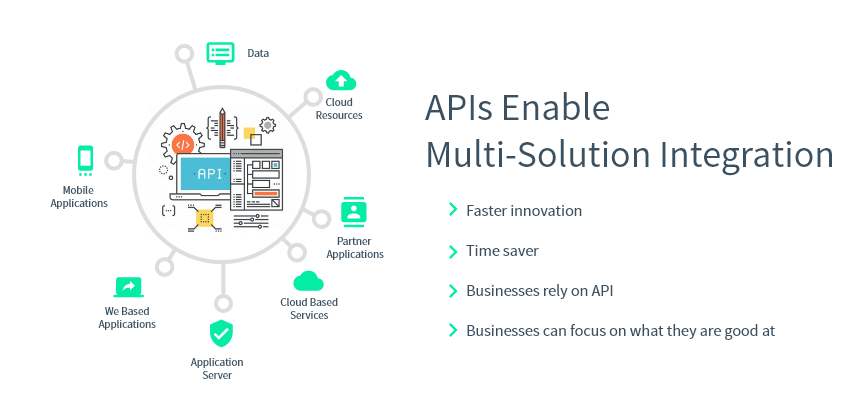
If this sounded technical, picture the API as a restaurant.
You are at your favorite pizza place, you look at the menu and order a cheese pizza and chocolate ice cream (I know! An unusual combination) hoping that it will be scrumptious. The kitchen is the part of the system that will prepare your order.
Now, the waiter (API) the critical link, will communicate your order to the kitchen and deliver food back to you.
You are placing the order for a structured format of data (pizza & ice cream) to the waiter and the meal you get is the response to the order you placed.
The food menu is the API’s set of guidelines and when an order is placed, processing happens in the kitchen and you get a response.
Also Read
How is API Shaping the Technology Around Us?
Now, you might think why in God’s name will a company hand over its valuable piece of code and technology to someone else.
But, the thing is, it will shock you to learn that many major companies like Facebook and Dropbox are giving insights into their codes. This is what makes APIs so great.
Companies are not giving entire access to their code. Instead, they give access to certain pieces of code that will help to connect your application with theirs. For example, take Google Maps and Yelp. Google Maps has its own API that will help developers display locations. Yelp will use this API to show locations instead of developing its own mapping system.
If you want to start an online business, you need not own anything except your business ideas because, in the future, a majority of websites will run on an API.
Sankar, Founder of ColorWhistle
Why Are APIs Becoming Very Important for Businesses?
There are several reasons why businesses like yours should consider launching an API.
- Faster innovation – The main reason APIs matter in the modern market is because they allow for faster innovation to an organization’s success
- Time saver – If you have ever logged into an application or website using your Facebook account, you’ll know how it saves a company from creating a system from scratch
- Businesses rely on API – Uber wouldn’t have existed without its API connection to Twilio, the messaging platform, or Google Maps
- Businesses can focus on what they are good at – Uber focused on their core competency and relied on APIs
As you can see, we rely on APIs without us knowing. Whether you use an app to see the traffic condition or to check the weather, these apps depend on APIs to pull data.
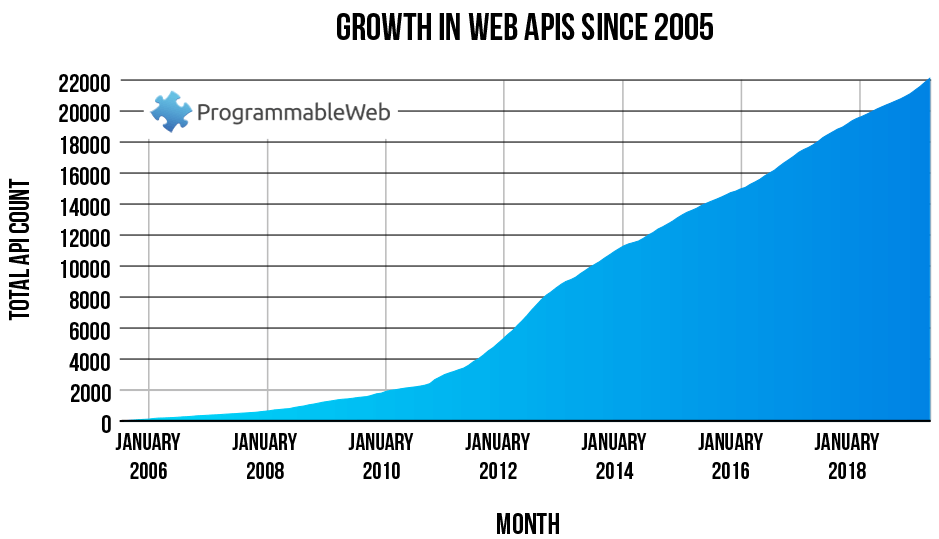
With all this codependence, API opens up a bright new realm that is not hung up on intellectual property rights. With over 20,000+ public APIs available, the number is just going to quadruple in the coming years. Overall, the future of APIs looks great!
How Any Industry Benefits From APIs?
Today, every sector both big and small depends on APIs in some capacity. Here are just a few examples.
1. APIs in Finance & Banking
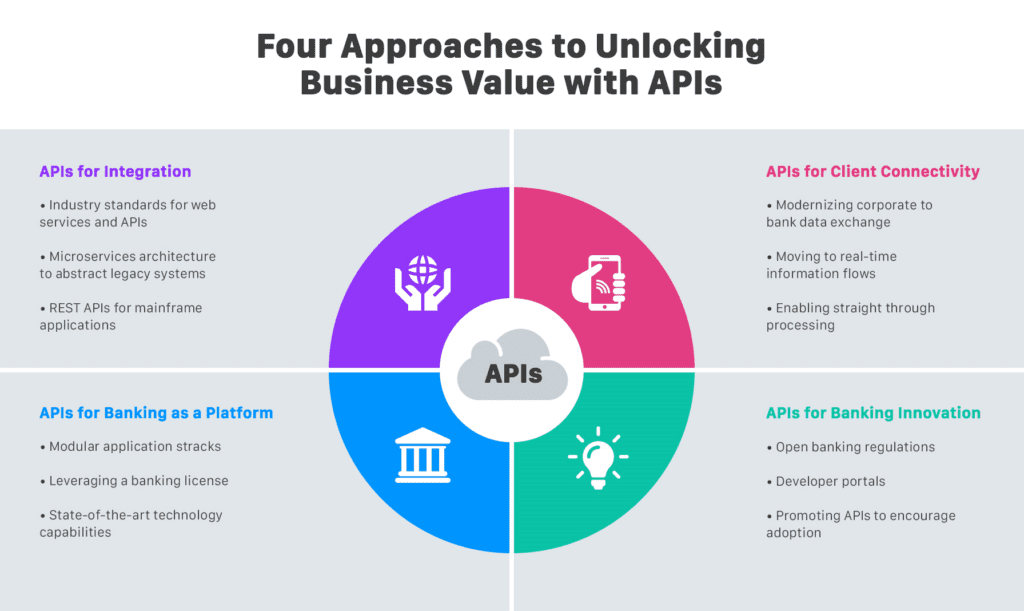
The leading banks and financial institutions have been around for decades but that doesn’t mean that they haven’t adapted to 21st-century technology. As these institutions are shifting to mobile apps, digital payments and blockchain technology, they use APIs to make this a reality. Here are some places where APIs are useful in finance and banking.
- Digital portals that help customers to exchange currencies rely on APIs
- Younger customers prefer cashless payments like Google Pay, Venmo and Chase QuickPay. Only through APIs this is possible
- API is required if customers want to check their bank balance on their smartphone, pay credit card bills online, view the loans they qualify for or transfer money
- For advanced fraud analytics solutions and to better pinpoint theft, APIs are necessary
If you like to learn more identifying API uses cases in the banking industry, IBM has written a detailed article. Click here to view the PDF.
Real-Time Examples of API in Finance and Banking
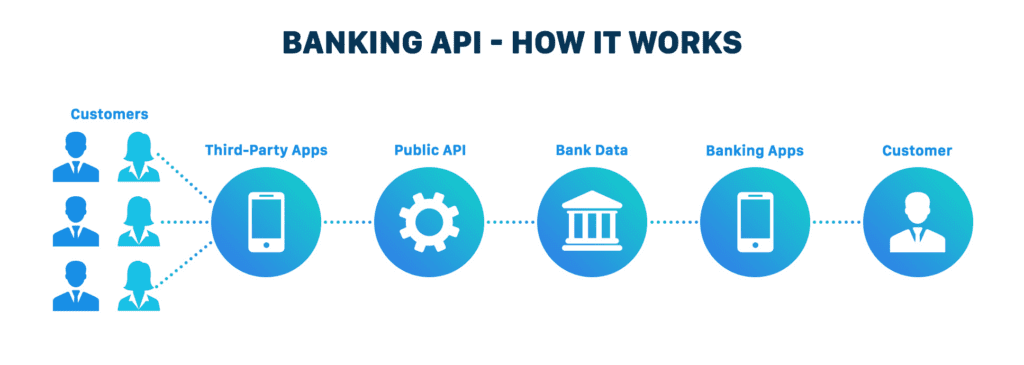
Here are some real use cases of API in finance and banking.
- Paypal/Siri integration – Using PayPal, users can now send and request money via a voice
- Facebook Messenger payments – Using Facebook Messenger, people can transfer money to their friends
- Banking chatbots – Helps customers solve many common problems by themselves
Best Banking APIs
Here are some of the best banking APIs.
2. APIs in Media & Publishing
According to journalism.org, In 2016, newspapers in the U.S. had a weekly circulation under 35 million. For comparison, circulation was over 63 million in 1973. As print is steadily declining, publishers have started to embrace the API technology to better meet the customer’s needs.
Zachary Seward, the Executive Editor of Quartz, described the firm as an API.
Here are some places where APIs are useful in media and publishing.
- Many online publishers rely on APIS to get content from publishers and creators
- Content syndication depends on APIs. Many publishers like The New York Times are creating custom APIs
- APIs help to bring content from the publisher to the consumer’s smart devices
Real-Time Examples of API in Media & Publishing
Here are some real use cases of API in media and publishing.
- Count likes – Get the total number of likes for assets such as photos and videos
- Content – Get a list of national and local news, entertainment videos and breaking news
- Sports – Get information about scoring, schedule, player profile and more
Best Media & Publishing APIs
Here are some of the best media and publishing APIs.
3. APIs in Retail & E-commerce.
According to Statistics, in 2018, about 1.8 billion people worldwide purchased goods online and the global e-retail sales will grow to up to $4.8 trillion by 2021. With online purchasing gaining momentum, let’s see how APIs are useful in retail and e-commerce.
The retailer must collect and analyze data to better understand customers and market trends. APIs are a key enabling technology for this essential activity.
Sachin Agarwal, Akana
- APIs help POS (point-of-sale) terminals accept payments from a variety of sources, including cash, cards and mobile devices
- Brick and mortar stores and e-commerce sites use APIs to keep track of inventory
- APIs help customers and companies track shipments
- Using APIs, employee scheduling and stock inventory can be determined
Also Read
Real-Time Examples of API in Retail & E-commerce
Here are some real use cases of API in retail & e-commerce.
- Pricing comparison– Receive periodic notifications regarding price fluctuations
- Shipping – Helps reduce errors associated with delivery
- Site search – Users can find items they need without searching the entire site
If you like to learn more identifying API uses cases in the retail industry, IBM has written a detailed article. Click here to view the PDF.
Best Retail and E-commerce APIs

Here are some of the best retail and e-commerce APIs.
4. APIs in Education
According to eLearning Industry, the global e-learning market will reach $325 billion by 2025. As e-learning is entering classrooms of all levels, educators increasingly rely on APIs to power everything.
Here are some real use cases where APIs are useful in education.
- As most of the tests and grading are done online, APIs connects the answers and scores to a central database
- Tracking attendance rolls, student profiles, directories and other necessary information is done with the help of APIs
- API helps with signing up for classes and checking class availability
- APIs help teachers to share lesson plans, develop curriculums and share files
Real-Time Examples of APIs in Education
Here are some real use cases of API in education.
- Application process – The administrative side of the application process can be taken care through APIs
- Registration & enrollment – Simplifies the process of collecting information and document copies
- Timetable updates – Share the course schedule and send instant updates about sudden changes
Best Education APIs
Here are some of the best education APIs.
- Google Classroom API
- GreatSchools API
- Khan Academy API
- WizIQ Virtual Classroom API
- Microsoft Graph Education API
5. APIs in Healthcare
According to referral MD, 93% of physicians find value in having a mobile health app connected to emergency health.
It goes without saying that APIs have closed the gap in many ways on how information is sent, retrieved and processed.
Jay Bercher, Solutions By Design II
From diagnoses, billing and insurance, let’s see how APIs are helping to power significant changes in healthcare.
- APIs help medical facilities to keep track of vaccine records, previous tests and vital patient data through any devices
- Patients can easily see when a doctor is available and book an appointment
- Hospitals can keep track of open beds and additional care before discharge through API enabled technology
- When implemented accurately, APIs can allow healthcare providers to bill accurately and reduce potential non-compliance concerns
Real-Time Examples of API in Healthcare
Here are some real use cases of API in healthcare.
- Connecting with physicians and patients – Connect with physicians and patients to provide faster, more up-to-date patient information
- Streamlining healthcare operations – Better predict staff requirements, reducing overtime costs and better serving patients
If you like to learn more identifying API uses cases in the healthcare industry, IBM has written a detailed article. Click here to view the PDF.
Best Healthcare APIs
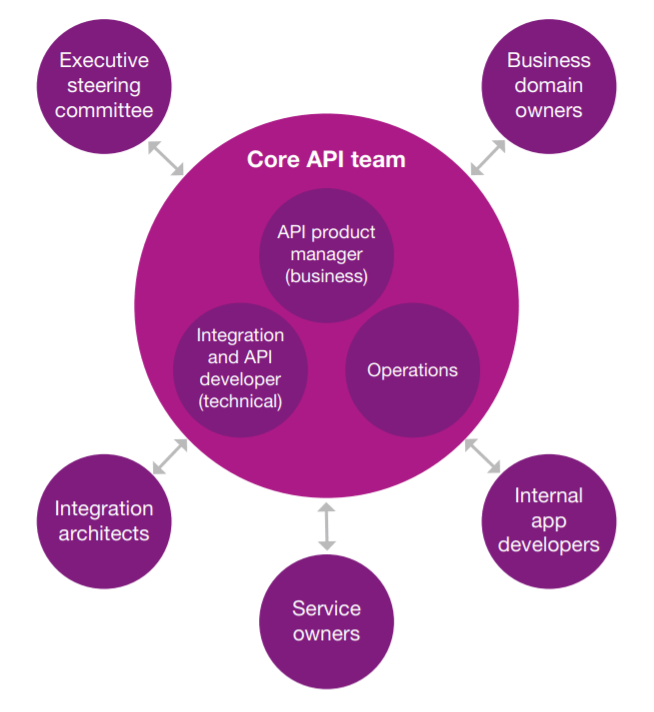
Here are some of the best healthcare APIs.
6. APIs in Manufacturing
According to the results presented at IFR CEO Roundtable, industrial robot sales increased worldwide by 31%. Manufacturers have been quick to embrace technologies such as robotics and APIs make most of this possible. Let’s see how APIs help manufacturing industries,
- API connectivity has helped to link the supply chain partners with accounts receivable and payable, link financial records and accurately oversee compliance related matters
- Modern factory floors rely on APIs to track and oversee everything from start to finish
- APIs are helping supply chain by enabling manufactures to track incoming parts and outgoing final goods
Real-Time Examples of API in Manufacturing
Here are some real use cases of API in Manufacturing.
- Predictive repairing – Manufacturers can obtain essential maintenance data to estimate current condition, warning signs and transmit alerts
- Asset tracking – Obtain real-time asset information and make reasonable decisions
- Logistics management – Eliminate risks concerning the costs related to vehicles, staff and transportation
Best Manufacturing APIs
Here are some of the best manufacturing APIs.
7. APIs in Travel & Tourism
According to a study by Fuel and Flip, travelers visit 4.4 unique websites to book their holidays. Most of these websites are all-in-one-place platforms that combine data from various sources through APIs. Let’s see how the travel industry benefits from APIs.
- APIs allows travel companies to offer agents to do real-time bookings on their own website
- Firms can show rich content to their clients on their website through APIs
- Travel companies can have complete control over the pricing of the inventory and add their own pricing rules
- As APIs are platform agnostic, bookings can be captured regardless of the platform they are built in
Real-Time Examples of API in Travel & Tourism
Here are some real use cases of API in travel and tourism.
- Navigating flight delays – Airlines now leverage API to send delay in flight to their passengers via text messages
- Itinerary improvement – With intelligent search capabilities can recommend destinations at good prices
Best Travel & Tourism APIs
Here are some of the best travel and tourism APIs.
What Are the Business Benefits of an API Driven Strategy?
Companies that consume APIs will experience the following benefits.
- Use of new technology – Modern application architectures such as cloud services and IOT devices depend on APIs to empower innovation
- Reduce time to market – As APIs reduces development efforts, applications can be introduced in the market easily which helps businesses save money and resources
- Provide good digital experiences – Since developers can build solutions across any channel through APIs, businesses can create engaging experiences for any audience
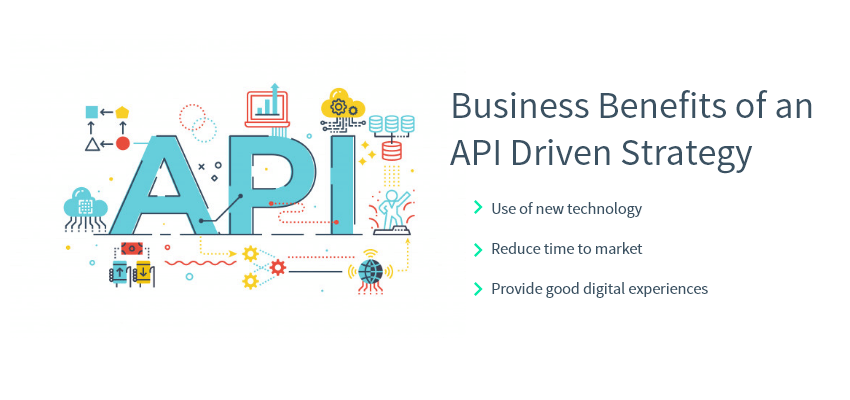
These business benefits make it clear that APIs are becoming a major element companies should implement to achieve digital success.
As APIs continue to grow, their evolution is presenting exciting business opportunities. One such development is headless APIs. We have written a detailed introduction blog about headless APIs. Do check it out if you like to learn more about it.
Looking for Web Development Services?
Seize and experience the transformative impact of Web Development Services & Solutions with ColorWhistle.
Conclusion
APIs are like doors. They provide access to information and functionality to other systems and applications. On the other hand, APIs share many common characteristics with doors, for example, they are secure and can be closely monitored.
APIs add value to a business as they allow them to monetize information assets, comply with new regulations, and enable innovation as they provide access to business capabilities.
In conclusion, API is emerging as a crucial capability to navigate the digital age. As businesses integrate IOT and other smart technology into their ecosystem, success lies in adopting API driven strategies.
If you need any help with API development, do contact or Call+1 210-787-3600 our ColorWhiste team. We can help you bring new possibilities and business opportunities for your company through our unique API solutions.
Will you invest in API solutions for your business? Please share your thoughts in the comments section below.
In quest of the Perfect Web Development Services & Solutions Buddy?
Be unrestricted to click the other trendy writes under this title that suits your needs the best!
- Headless CMS Explained! – The Future of Web Development
- Top 13 Websites Built With Elementor Builder
- Website Design Statistics Guide
- A Complete Guide to Website ADA Compliance
- 11 Best eCommerce CMS for Online Businesses
- Visualizing Kitchen with Modern Technologies
- Agency vs Freelancer – The Ultimate Decision Guide

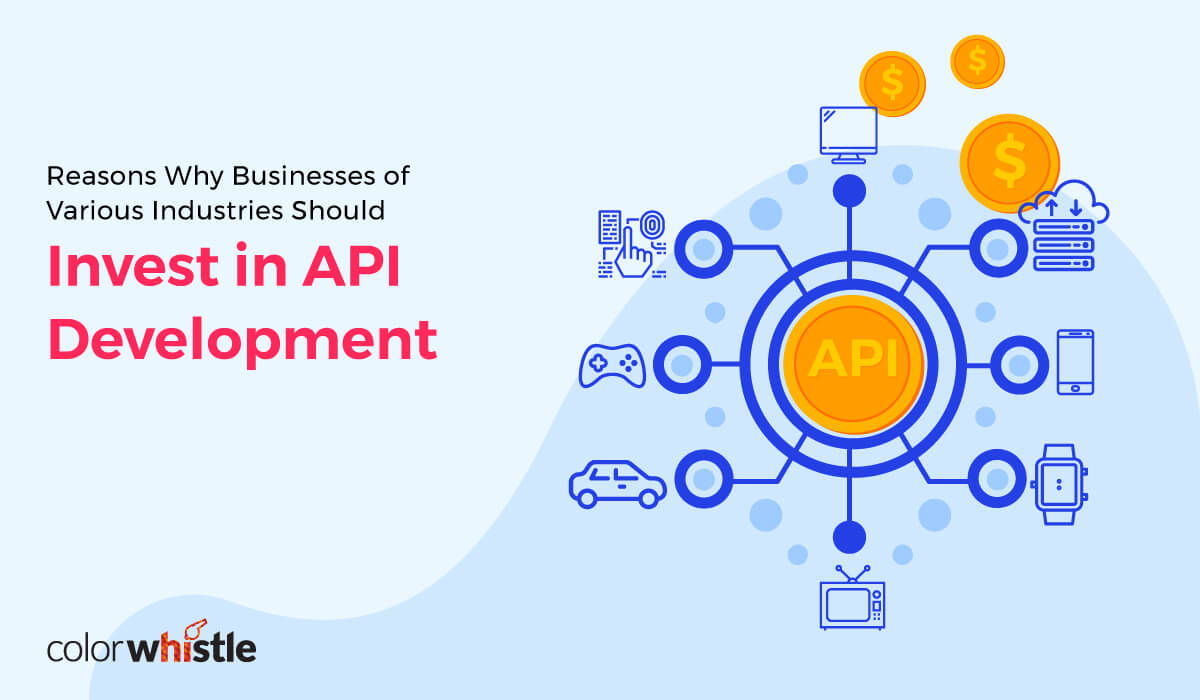

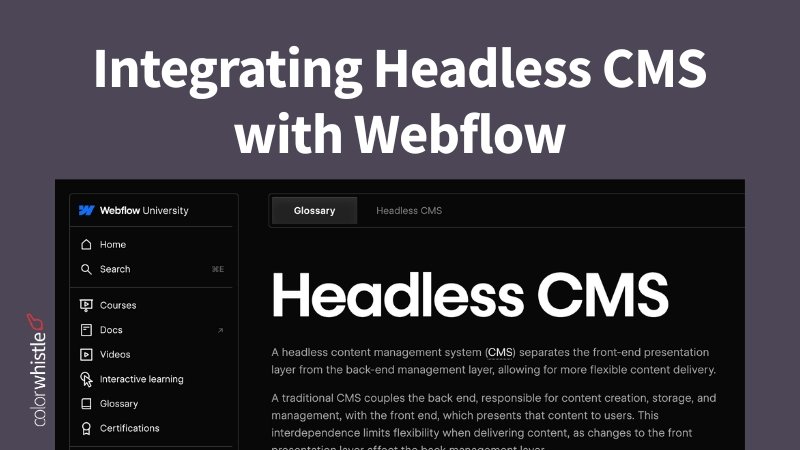


Worderfull blog i am impressed
Your web developer & SEO specialist is here to Boost your Online Presence